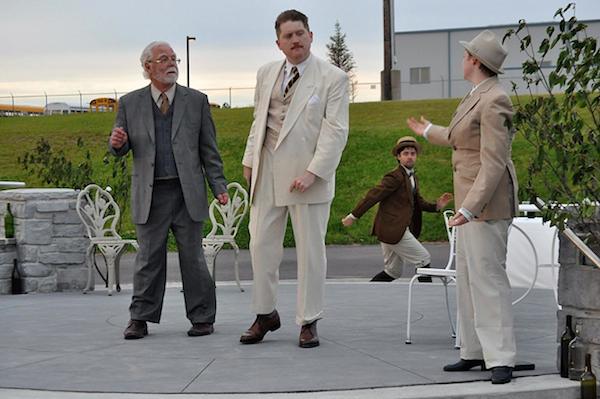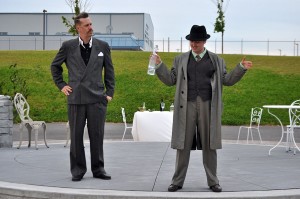
Not that it isn’t a fairly complicated plot: The Count, Claudio, is back in town from the war with his colleagues Benedick and Don Pedro, and of course Don Pedro’s bastard half-brother, Don John. Claudio instantly falls in love with Hero—as is the case in Shakespearean comedies—and Don Pedro agrees to woo her for him. Don John—being a bastard—takes it on himself to mess with the plan just because he doesn’t like his brother or his friends. When that plot doesn’t work he tries another one that does. After countless cases of mistaken identity, trials and faked deaths, everything works out in the end.
On top of that, there is a scheme to get Benedick to marry Beatrice even though they hate each other. Benedick, a confirmed bachelor, claims he will never marry and, in order to win a bet, Don Pedro and Claudio—when not working on their own complicated scheme with Hero—create another scheme to get the two near enemies together. After countless overheard conversations, stolen letters, and yes, mistaken identities, everything works out in the end.
One new challenge director Bonnie MacLeod took on with this production was removing it from its assumed Elizabethan timeframe and setting it in the more modern 1920s; post WWI. Surprisingly, the plot, attitudes, and mood of the play lent itself perfectly to this time shift. Power struggles, battles of wit, and challenges of honour all translated rather well.

The comedic team of Sam White, Amber Cragg, and Jeff Plumridge (as the bumbling constables of the area) do a great job of bursting onto the scene just enough to up the comedy factor, but not so much as to be distracting. Plumridge did a particularly good job of being the straightman to White and Cragg’s goofs.
All of that said, my one negative comment on the show is the ending. The audience has come to expect a big finale to the Bandshell Players shows—a dance number, a wedding—something to leave us awed. This time, with mention of a dance and a wedding and the punishment of Don John, we instead were left hanging. Many in the audience actually expected something else to happen after the curtain call, and when nothing did, it was somewhat of a let down.
If you have never seen Shakespeare performed, Much Ado About Nothing at the Open Hearth Park is a great introduction to the genre. The set, costumes, and performances are all perfectly in tune with the mood and setting; the plot is quite simple to jump into; and there are so many likable characters that it is hard to walk away disappointed.
Much Ado wraps up Sunday (June 28) at the Open Hearth Park (there are signs to guide you along). The show begins at 7:00pm and is pay-what-you-can. Bring a jacket and blanket—it can get a bit cold out there.

